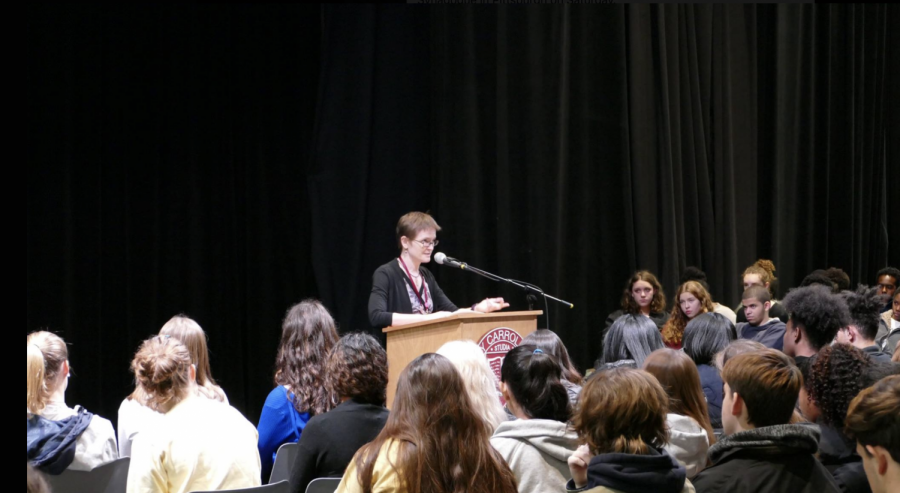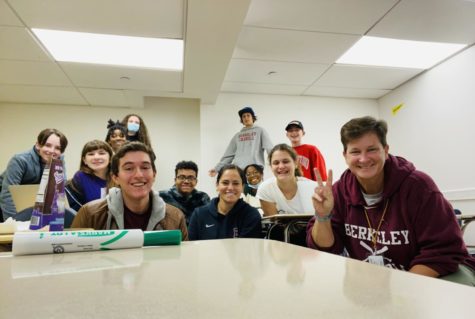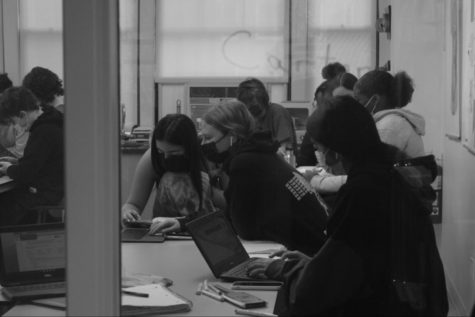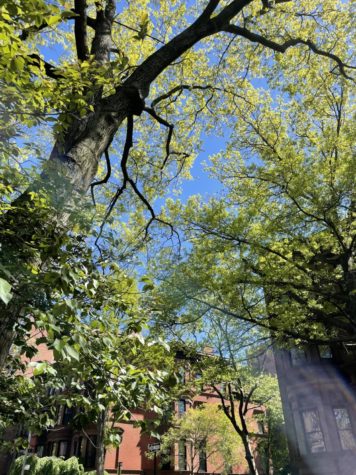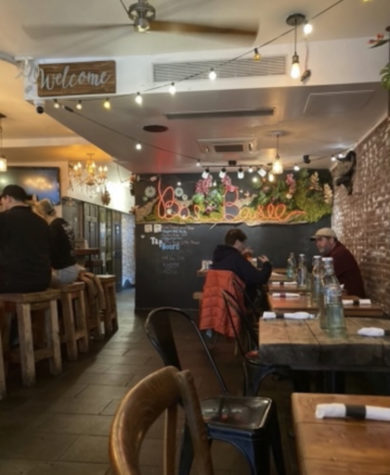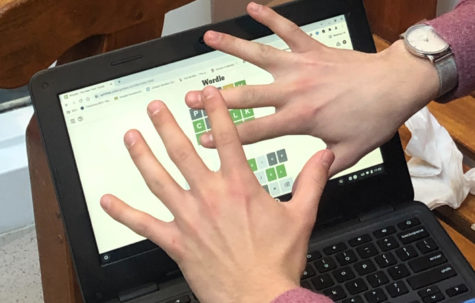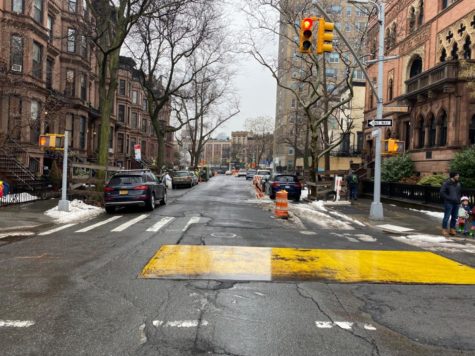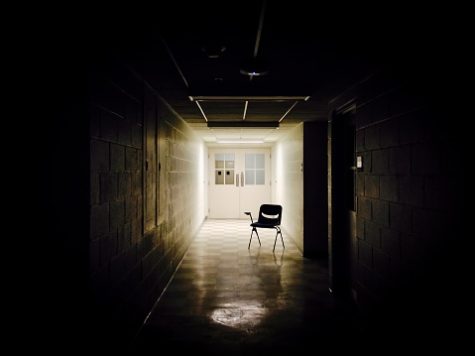BC’s Reactions To The Tree Of Life Shooting; And What Can Be Done
On October 29, the Berkeley Carroll Upper School Community gathered together in order to reflect on the recent mass shooting and hate crime that had occurred two days prior at the Tree of Life—Or L’Simcha Congregation—Synagogue in the Squirrel Hill neighborhood of Pittsburgh, Pennsylvania. Eleven people were killed and seven injured, making it the deadliest attack on the Jewish Community in United States history. The shooting came on the heels of a year that has seen a sharp rise in mass shootings, hate crimes, and Anti-Semitic rhetoric fueled by the American government. This shooting, in particular, was of extreme importance to our school community, with many members having ties to Pittsburgh, to the synagogue, and to the Jewish culture and faith, all of which were directly put under attack by the shooting.
The assembly consisted of short remarks by both Ms. Moore and Ms. Drezner, which were then followed with three minutes of silent reflection, and then the playing of the theme from the movie Schindler’s List by John Williams. No time was allocated for students to share what they were feeling, and I was left wondering as to why this was the case. When asked about why the assembly was structured the way it was Ms. Moore stated that she and the other planners of the assembly—Ms. Drezner and Mr. Vitalo—decided, “that if the intent was to reflect more than to react, then fewer words would be preferable to many—my introduction was fairly short and attempted to put the event in context by naming the other shootings at places of worship, including the intended shooting at a place of worship a few days before. Ms. Drezner’s remarks were fairly short as well, and attempted to leave room for varying kinds of reactions and feelings amongst the community.” (Ms. Moore)
Given the belief of the organizers of the assembly that fewer words would be preferable, given the gravity of the subject at hand, I wondered if their judgment of what the student and faculty body needed had been appropriate, and how the student body reacted to these decisions. From my own perspective, I felt unnerved that the assembly had not ended with at least words from the student body, as in my mind, it made the assembly feel incomplete. I couldn’t begin to understand how the members of our community most affected by the shooting would be able to begin healing if they weren’t able to share the multitudes of emotions that must have been swarming inside themselves. Keeping my own thoughts in mind, as well as the words of Ms. Moore, I used the first and second questions on the questionnaire I sent to the entire BC student body to seek the answers I was looking for through asking; How do you feel/think the assembly went? And what did you like and dislike about the structure of the assembly?
A striking response to the first question came in from Janey T. ‘21 who said, “I feel like the assembly went fine. It didn’t really feel like an assembly meant solely to recognize the lives lost, it felt like a quick sidebar. I would have appreciated it if we were able to hear from a student to get a grasp on how the shooting has affected our peers.” I directly related to her thoughts, truly feeling like the student’s voice was missing.
Coming from a distinctly different, but still connected perspective, Sierra C. ‘20 responded by saying, “I thought the assembly went well, and I thought it was impactful to have the three minute silence then have music at the end. I liked how we didn’t focus too much on the actual news story of the event, but more about honoring those who died. I felt very emotional at the end of the assembly and it had an impact on me.” Although both felt there were pros and cons to the assembly itself, the general consensus among them was that the assembly did an alright job for them.
Similarly to these two statements, Jake P. ‘20, spoke to how “the speech from Ms. Drezner (being given from a person who has direct connections to the victims) was a genuinely well thought out decision. Her speech grounded the issue directly, rather than encouraging broad and nebulous discussion.” Like the previous responses, Jake applauded one of the strategic choices made by the organizers. However, he also saw a flaw in the assembly’s design stating, “I absolutely despised the musical component which ended the assembly. There was absolutely no reason to play any music after a reflective moment of silence, and it conveyed the notion that this shooting warranted a more emotional response than others which occurred this year. No music had been played during assemblies for larger shootings. No music had been played during assemblies for shootings of children who have a similar median age to our student body. No music had been played during assemblies prior, and nor should there have been.”
In the same manner, Janey also had grievances with the assembly stating, “I think the audience should have been given time to process what the Ms. Drezner and Mr. Vitalo had said.” I couldn’t have agreed any more with what she said. Leaving directly after the music was jarring, giving myself, and I’m sure many students, little time to process its meaning, and their own thoughts. Regardless of how you viewed the assembly, it is clear that while it made a huge impact to some, it fell short for many others.
While all the respondents answers varied in many different ways, from an overall average take on the assembly, to deep criticisms of parts of it, the responses all spoke to the weight of the assembly, and the importance there was of achieving a perfect tone—so as to give the shooting the attention and reflection it warranted. My thoughts then traveled to what they believed made the shooting so impactful that it necessitated an entire assembly—especially one so different from the assemblies of the past few years. From simply watching the news or reading the newspaper, mass shootings have become normalized across the country, so what was different? The third question of my questionnaire, as such, was; What do you think made the shooting at the Tree of Life Synagogue important enough to warrant a school-wide assembly about it?
A response I was expecting was given by Jake P. ‘20 in which he states, “members of the student body and members of the faculty have direct familial ties to Pittsburgh given the geographical closeness. Moreover this shooting was motivated by religious means rather than other means. Religion has a unique role in society of uniting people, and clearly members of the Jewish religion had felt that people of their own (family?) tribe were directly targeted.” As previously stated, given the large Jewish population at BC, it would be easy to make the connection that it deeply affected so many members of the community and that some event had to occur to discuss and reflect on it.
The most impactful of all the responses I received was from Maris H. ‘21, where she eloquently spoke about the importance of the shooting. Not only to how it affected many in community, but also to how the assembly was an opportunity for the community to come together, and shy away from being desentized to these recurring mass shootings. She states, “I think what made this a necessary assembly is that this mass shooting really has the potential to be a real eye opener for a lot of the people in the BC community. It’s easy to disassociate yourself from the victims of mass shootings and hate crimes. It’s easy to desensitize yourself to them—but it’s not necessarily our fault. When people are constantly dying needlessly, one shooting after another, it’s easy to be thankful it wasn’t you and move on. That mindset is necessary in some ways, yes, but it’s still harmful when it comes to sympathizing and taking action. A lot of people struggle to relate to (and thus talk about) issues that don’t pertain to them-—not just in the BC community. However, what the assembly did is make the Tree of Life Synagogue shooting personal. The room was stifling. It made you think: “This is happening. It could’ve been me or a loved one. We need change.” Because BC has a large amount of people that would relate easier to this mass shooting, it not only showed us that we cannot continue to live inside of a bubble, but also creates a bridge toward feeling the same amount of outrage with other occurrences. We cannot live inside of a bubble. Because, whether we like it or not, that bubble is not real. It’s self created. We disassociate and live our lives under the impression we will never be another statistic. We are just as susceptible as anyone else.” The reality of Maris’ statement couldn’t be any more real. So often are these mass shootings considered singular moments of senseless violence that could never occur again. Reality, however has morphed into one where these shootings are a constant, and they simply can’t be ignored.
While the assembly was important to serve as a time of reflection for the many members of our community most affected by the tragedy, it should also be seen as a moment of realization for our community. Realization that talking about the tragedy is important, but action has to follow. The shooting at the Tree of Life Synagogue simply cannot fade into the background after a few days—it has to be remembered and action has to be taken to prevent a similar act of violence from occurring again.
Given also that one of the main intentions of the assembly was to allow for each member of our school community to have a different reaction, I wondered if that had occurred. Speaking from my own perspective I must confess that I didn’t have an immediate emotional reaction of anger, or sadness, or even of really any emotion when I first heard about the shooting. Thinking back on how I first responded, it’s shocking to me that I didn’t feel as emotional about it, as I had for other shootings—Sandy Hook and Parkland in particular. Maybe, it was because I wasn’t personally affected by it, or maybe because these shootings have become the norm in our society, that I am simply so used to hearing about them that unless I am personally affected or those of a similar age to myself have been affected, they no longer produce any profound effect on me.
After leaving the assembly, I didn’t feel any differently than I described above, instead just being left wondering if the feelings of the BC community were the same as mine, and if not, then why? With this in mind, the last question of my questionnaire to BC students was; Overall, following the shooting how are you feeling emotionally? Are you scared, afraid, angry, etc, and why?
The four responses I received were as followed:
Sierra said she was, “just sad. I am not so much scared as I am angry, and I believe that the need to ban guns is bigger than ever.”
A like-minded response came in from Maris in which she stated she was “outraged because I feel like nothing is changing. People are dying and all anyone cares about is money and their own well-being. I’m afraid because I’m a young Black woman living in America—a country where the odds are hardly ever going to be in my favor. I’m revolted at the general apathy of the public toward mass shootings and hate crimes. I’m tired of thoughts and prayers. I’m tired of hashtags raising awareness trending for a day on Twitter and being forgotten the day after. I’m tired of people wasting their vote. Without a doubt, the assembly has left me itching for change.”
On the flip side to these two responses—more in line with how I was feeling after the shooting—Jake spoke to how the shooting hasn’t changed anything in regards to his emotional state, stating, “this may be because of an over-exposure to the issue, or because I knew nobody in the tragedy. Either way, I am more concerned with the immediate political impact – from which there seem to be none. Gun sales after this mass shooting are actually going down, something that isn’t the natural case. In fact, normally after mass shootings, gun sales increase because people want to buy the guns before a new ban gets passed. People aren’t afraid of congressional action anymore. When ardent gun-hawks don’t seem to think that this shooting warrants a response I am fearfully following their footsteps. Another shooting will happen at some point, but chances are it won’t happen where I live. As such, worrying won’t do anything on a national level – but it will stress me out.”
Similarly to Jake, Janey plainly stated, “as always after a mass shooting, I’m scared and angry, but I also feel a little numb. Mass shootings have become so normalized that it doesn’t come as a surprise when you hear about it in the news. It is sad to think that I’m growing up in an era of gun violence.”
In sum, the emotions of the BC community are mixed about this tragic event, ranging from feelings of anger, sadness, and fear, to a sense of apathy and numbness towards the continual recurrence of these mass shootings in American society every year. Indifference, however, is not an option. We cannot let this madness be taken for granted as if we were facing a biblical curse. I know it may seem like no matter what we do, nothing will ever change, but that is the exact attitude that will halt any sort of progress from ever being made. As the next generation of Americans, we have to strive towards not only changing governmental policies, but also towards changing public opinion. We can do this through calling our local and state representatives and attending protests and rallies. Only once we are able to stand together as a united front, will change come.
An easy way to get involved in helping to implement new gun control laws is to join BC’s very own nationally accredited, Student’s Demand Action Club, currently led by Abigail L. ‘20. For more information on how you can join, the club can be found every Day 5 during the Co-curricular block in Room 1.

